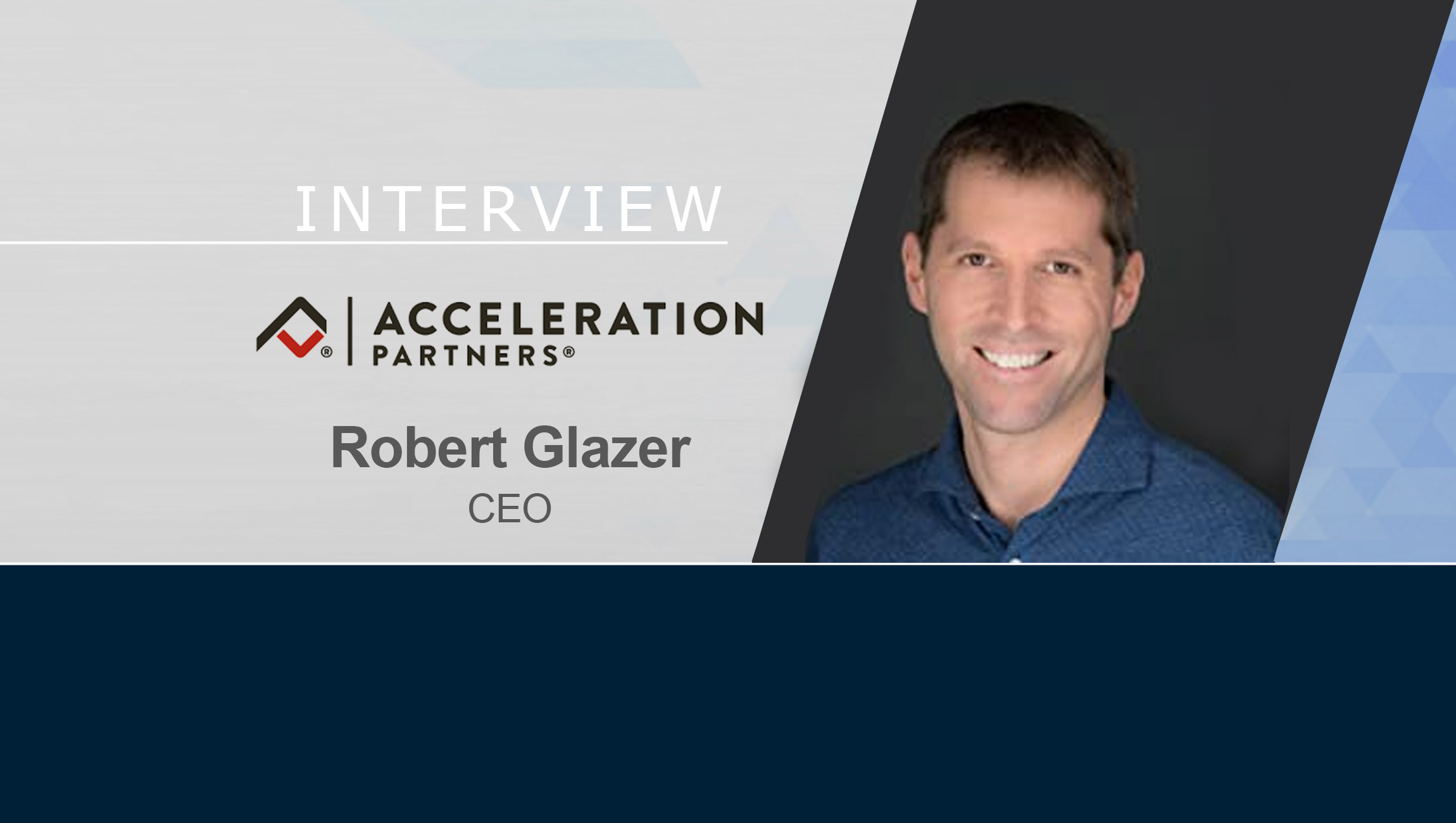Robert Glazer, CEO at Acceleration Partners joins us in this quick chat to take us through his marketing agency’s growth story while sharing a few tips that can help sales and marketing leaders thrive in a remote working world. _______ I’m founder and CEO of Acceleration Partners, the largest independent partner marketing agency in the world. We’ve received numerous awards for both our industry performance and company culture, and we have a global team of 200 employees who all work from home. I’m also the author of Friday Forward, a weekly inspirational newsletter that started as a note to my team at Acceleration Partners and now has a global readership of 200,000 people in 60 countries. I’m also the author of four books: Elevate, Friday Forward, How To Thrive In The Virtual Workplace and Performance Partnerships, and I’m the host of the Elevate Podcast. On the tactical side, we urge our employees to set a clear, consistent schedule for themselves. We recommend setting a consistent start and end time to the workday to avoid letting work spill over into non-work life. Within that workday, we also recommend time-blocking, where each portion of the day is allocated toward specific tasks, such as meetings, inbox management, focus-intensive projects, etc. On the tools side, we use several digital tools to make collaboration and connection easier. Like many others, we’re especially dedicated to video communications, including using video calls for all client-facing calls and for most of our internal calls as well. We also use asynchronous video to share material that is a bit too nuanced for a memo but doesn’t require everyone to join a meeting at the same time. I recommend this particularly to leaders: if you have something important to communicate for your team but don’t want to pull everyone into a virtual meeting, it’s often easiest and clearest to record a video message your team can watch on their own time. Marketing Technology News: MarTech Interview with Jake Weatherly, CEO at SheerID One of the biggest adjustments that managers have faced in a remote world over the past 12 months is figuring out how to manage their teams without seeing them in person every day. Some of these leaders prioritize inputs like time spent working or are constantly monitoring their employees to make sure they are working. This is a mistake in any work environment because it puts unnecessary pressure on employees, focuses on the wrong things and erodes trust in the team. Instead, managers and leaders should set clear outcomes they want their employees to achieve, then measure employee performance against those outcomes. If your employees are achieving the desired business outcomes—whether that’s a deliverable, a metric, a sales quota or something similar—you don’t need to worry about how they are spending their time. We understand this intuitively in sales. Most of us would rather have a salesperson who works 30 hours a week and closes $250,000 in sales per quarter, rather than a salesperson who works 60 hours a week and closes $150,000. We know the sales outcome is what matters most, and we should apply that understanding to managing all other roles. The best thing marketing and sales teams can do is get clear alignment on the outcomes they’re trying to achieve and tailor both of their respective strategies toward pursuing those outcomes. This will ensure your marketing team is delivering the types of leads the sales team needs to get the sales outcomes your company needs, rather than creating a scenario where the two teams are pursuing different incentives and going in different direction. In most industries and companies, remote work can be an unequivocal positive for an organization. It creates the flexibility many employees crave, allows companies to recruit from a broader talent pool and allows the company to save money on office expenses and invest those resources elsewhere. For most companies, remote work is challenging only when it isn’t done effectively. Marketing Technology News: MarTech Interview with Eric Theobald, SVP of Products and Engineering at CareerBuilder This is especially true for hybrid workplaces, which need to be created as a strategy itself, not a way to split the difference between entirely in-office and entirely remote. Companies with a hybrid workplace need to set clear rules and norms about how often employees need to be in the office, rather than abruptly calling people in for meetings and trainings. They must ensure that remote employees are not passed over for recognition or opportunities. They must create opportunities for the whole team to interact virtually and occasional in-person events—such as an annual all company summit—that put everyone on the same playing field. This is true for all companies and teams. One of the most important remote work principles for all leaders to know, including sales and marketing: onboarding is even more crucial in a remote or hybrid organization than it is in-person. A lot of in-person companies train employees by just having new hires shadow an existing employee for a day, without much formal training beyond that. Because a remote employee doesn’t have an office full of people to learn from, remote teams must proactively create a training schedule for each new employee. They need to make sure they have centralized resources in a learning management system so that new hires can learn about the company’s culture and key process. They need to ensure members of the team have blocked off time in their own schedule to train and get acquainted with new hires so that the new hire feels connected to their new team and has the knowledge they need to do their job from day one. In our experience, it’s really hard to overcome a bad start as a remote worker, so training has to be done thoroughly. First and foremost, focus on authenticity and creating value for others. For the former, a company should really lean into their values and use them to guide their content and messaging. Prospects, customers and clients will know if you’re trying to present your company as something it’s not, rather than what you actually are and what you stand for. Similarly, while a newsletter can have the long-term objective of winning potential customers and clients, you don’t want to be overly sales-oriented. Instead, focus on sharing information that is valuable for prospects. For example, when companies were adapting to remote work early in the pandemic, we featured a ton of our remote work expertise and resources for free in our company newsletters. This shows prospects that you don’t just think of them as a potential customer—you care about them, they can trust you and you are a company worth partnering with in the long run. Marketing Technology News: MarTech Interview with Ashley Kramer, CMO at Sisense Robert Glazer is the founder and CEO of Acceleration Partners, a global partner marketing agency and the recipient of numerous industry and company culture awards, including Glassdoor’s Employees’ Choice Awards two years in a row. He is the author of the inspirational newsletter Friday Forward, and the Wall Street Journal, USA Today and international bestselling author of four books: Elevate, Friday Forward, How To Thrive In The Virtual Workplace and Performance Partnerships. He is a sought-after speaker by companies and organizations around the world and is the host of The Elevate Podcast.Tell us a little about yourself…we’d love to hear about Acceleration Partners?
We are in year 2 of the ongoing global pandemic; we’d love a few top tips on workplace productivity and tools that have enabled your team’s efforts and those you’d like to focus on here?
While managing a completely virtual team and business, what are some top dos / don’ts (given the learnings from 2020 and 2021) that you feel business leaders need to now focus on more?
How can marketing and sales teams work better together during this time to create more business impact (strategies / tips / tools)?
As companies and teams grow during this uncertain period, being remote can be a pro but also a setback in many ways: what are your thoughts on the long term impact of remote work or hybrid cultures on marketing / sales teams and processes?
A few thoughts for sales and marketing leaders on this same note?
And finally, seeing the success of your Friday Forward newsletter: a few tips on how marketing teams can use newsletters as a channel to build better trust and prospect base during this time?
The Best Ways to Push Better Sales and Marketing Outcomes in 2021? Be More Creative and Strategic. Catch more from these SalesStar Podcasts:













Comments are closed.